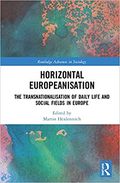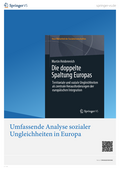News
7.-9.6.2024: International conference “Digital Inequalities: Policies and Good Practices” Burgas, Bulgarien
Conference paper by Prof. Dr. Martin Heidenreich, University Oldenburg, Germany: „Technological Change, Digitalization and Occupational Skills in Europe. Between Polarization, Upgrading and Downgrading”
Presentation "Die EU. Ein Erfolgsprojekt vor neuen Herausforderungen" by Prof. Dr. Martin Heidenreich
As part of the Education and Social Sciences lecture series with 12 events from the end of May to the beginning of December, Prof. Dr Martin Heidenreich (Institute for Social Sciences) will talk about: ‘Die EU. Ein Erfolgsprojekt vor neuen Herausforderungen‘ in the auditorium of the former Oldenburg Teachers' Seminar (Peterstraße 42).
Martin Heidenreich: Wirtschaftliche Spaltungen und soziale Ungleichheiten in Europa
A central basis for the social cohesion of the EU is the economic convergence of its member states. In recent years, however, the concentration of scientific, technological and entrepreneurial expertise has meant that economic and income differences, particularly in the old EU member states, are no longer converging. In view of the weakening of Europe-wide convergence processes and considerable spatial and social differences, the EU faces the challenge of ensuring social cohesion in Europe through independent transnational policies.
Journal article Prof. Dr Martin Heidenreich
Heidenreich, M. (2023). Equal treatment in the single market? Labour market opportunities for migrants with a European and a non-European background. Culture, Practice & Europeanization, 8(1), 6-25.
Heidenreich, Martin; Broschinski, Sven: Is Property an Insurance or an Additional Burden? Financial Stress Among Homeowners in Europe
Heidenreich, Martin; Broschinski, Sven (2023): Is Property an Insurance or an Additional Burden? Financial Stress Among Homeowners in Europe. Social Inclusion, 11 (1).
A crucial function of wealth is to protect individuals from the consequences of adverse life events. However, sometimes wealth also implies additional financial risks. In addition to the insurance function of homeownership (the most common form of wealth), we therefore also examine financial squeezes that reflect the indebtedness and social embeddedness of homeowners and limit their options for dealing with social risks. A third hypothesis expects a trade-off between social protection and homeownership. Taking the example of unemployment, we examine the effects of short-term unemployment on the perceived financial situation of households based on data derived from EU-SILC for 27 European countries. It can be shown that debt-free homeownership reduces financial stress in the case of unemployment compared to tenants and indebted owners. A debt-free home thus offers an additional buffer and insurance against the financial consequences of unemployment. However, indebted homeowners are particularly hard hit by unemployment because they have to use all their financial resources to pay off their mortgages. Finally, we did not find a trade-off but a cumulation of advantages due to homeownership and generous unemployment benefits in countries with high net replacement rates.
Interview Socio-economic inequalities and conflicts in Europe
The European Union is more economically integrated than ever before. At the same time, deep social and inter-state inequalities continue to permeate Europe. Sociologist Martin Heidenreich explains how these are connected and what can be done about them in an interview (in german) with te.ma
Cusanuswerk: Student council conference "The euro, child with 20 parents - a patchwork family in the inflation dilemma"
On 4 November 2023, Prof. Dr Martin Heidenreich will give the lecture "Social inequalities in Europe. Possible influences of European monetary and fiscal policy" at the Cusanuswerk student council conference in Frankfurt am Main.
Martin Heidenreich & Katharina Al-Shamery: Power and good academic practice: A local perspective
Ensuring good academic practice is an important task of universities and other scientific organisations. University GWP committees and the ombudspersons assigned to them are central to the implementation of GWP rules. Starting from a power-theoretical perspective and based on their many years of work as ombudspersons, the authors analyse the challenges associated with GWP using three examples and draw four more general conclusions for the work of university ombudspersons.
Three reviews
I have just discovered three reviews of my book on inequality (Blossfeld 2023; Börner 2023; Tietze 2023). I was very pleased about this and would like to expressly thank the three authors and the two journals for this honour - especially because I know how much time it takes to read and comment on a book of over 400 pages. Reading the content of the reviews was also extremely inspiring, as they opened up new perspectives for me. For example, Blossfeld (2023) locates the reconstructed Europeanisation processes within the framework of the Galton problem, i.e. the "fact that it is difficult to view individual countries only as independent nation states in international comparative analyses, as they are not independent of each other due to supranational political and economic organisations such as the European Union and undergo similar processes". This is a very exciting idea that opens up many further possibilities for European research. Mrs Blossfeld is absolutely right that I did not find the placement of the education chapter in a structure determined primarily by economic inequalities convincing. Börner (2023) summarises the concerns of sociological research on Europe once again: It is about "taking seriously the European social space that has undoubtedly emerged in its significantly more deeply layered social qualities and investigating the 'new, Europe-related conditioning factors and dynamics of social inequality' (p. 30) in this space." Ms Börner rightly emphasises that I am very cautious in my assessment of the effectiveness of the EU's structural policy and social policy initiatives (unlike in earlier works on the Open Method of Coordination) - with the exception of labour market and education policies coordinated across Europe, the effectiveness of which can certainly be demonstrated on the basis of microdata. Regional funding quotas from the Structural and Cohesion Funds had no demonstrable effect - something I should have documented in the book. The described Europe-wide convergence of wage and income levels, on the other hand, is more likely to be interpreted as the result of economic opening processes. Ms Börner also rightly emphasises that "in addition to the external manifestation of territorial state borders, there are other possibilities for drawing borders, such as symbolic border demarcation or the establishment of political membership borders" and that such border demarcations can be the basis for internal structural formation processes and new forms of social cohesion, especially in a perspective inspired by Stein Rokkan. Tietze (2023) rightly criticises the fact that hardly any questions are asked about "which groups in which EU member states benefit from the economic divisions in Europe". She recommends a stronger "focus on the "winners' side" (...) in order to understand the production and maintenance of social and territorial inequalities and to focus on the associated economic and political power relations." In the English edition of the book, I have indeed added a chapter on wealth inequalities, but without coming close to the desideratum formulated by Tietze of a better understanding of the "production and maintenance of social and territorial inequalities (... and the economic and political power relations associated with them; MH)". This certainly also points to the limitations of the data basis used. Tietze also rightly doubts the informative value of necessarily highly aggregated distinctions between central and peripheral regions and proposes instead to distinguish between "knowledge-intensive service and technological industrial metropolises with a high demand for qualified workers as well as low-wage service providers in the north and west as well as in the south and east of Europe" - a consideration that is at the centre of the fourth chapter and which suggests possible connections to older and more recent work on regional economic differences in Europe. I would like to thank you for these instructive and extraordinarily competent and stimulating reviews. Bibliography Blossfeld, Pia Nicoletta (2023): Martin Heidenreich (2022): The Double Divide in Europe. Territorial and social inequalities as central challenges of European integration. In: Austrian Journal of Sociology 48 (1), pp. 145-149. DOI: 10.1007/s11614-023-00516-4. Börner, Stefanie (2023): The sociologisation of European inequalities. Martin Heidenreich, Die doppelte Spaltung Europas: Territoriale und soziale Ungleichheiten als zentrale Herausforderungen der europäischen Integration. Wiesbaden: Springer VS 2022, 456 p., gb., 79,99 €. In: Sociological Review 46 (1), pp. 11-18. DOI: 10.1515/srsr-2023-2011. Tietze, Nikola (2023): An inequality-sociological look at "The double division of Europe". Martin Heidenreich, Die doppelte Spaltung Europas: Territoriale und soziale Ungleichheiten als zentrale Herausforderungen der europäischen Integration. Wiesbaden: Springer VS 2022, 456 p., gb., 79,99 €. In: Sociological Review 46 (1), pp. 4-10. DOI: 10.1515/srsr-2023-2010.

Europe as peace project
With Europe Day on 9 May, the European Union celebrates its unity. In this interview, social scientist and Europe expert Martin Heidenreich talks about the role of the EU for peace in Europe and the prospect of accession as a means of EU foreign policy.

New Book:
Territorial and Social Inequalities in Europe
Challenges of European Integration
About this book
This book examines social inequalities in Europe, especially those caused by economic factors. It starts with the paradox of European inequality, where on the one hand, even total income inequality in Europe is significantly lower than in most parts of the world; but on the other, Europe is also characterised by profound and durable inequalities within the continent. It discusses inequalities caused by the exclusion of marginalised groups from the labour market, with considerable and sometimes increasing differences between central and peripheral regions, pronounced wealth and labour market inequalities, and significant rates of persistent poverty, deprivation, educational poverty, low wages and unemployment. The book also discusses broader territorial inequalities, which are the basis for divisions between Northern and Southern Europe, East and West, between qualified and unqualified employees, younger and older people, men and women, and migrants and non-migrants. The book raises questions about the winners and losers of the social transformations linked to the introduction of the Euro, the Eastern enlargement of the EU, and the financial and Eurozone crises. It is based on a comprehensive analysis of a European-wide microdata set on income and living conditions (EU-SILC). The empirical research material, which is the first to deploy this data in a comprehensive manner, consists of detailed empirical analyses of social divisions and Europeanisation processes in 30 European countries. It analyses and explains the transformation of the previously dominant national spaces into a European social space.
This topical book is of interest to academics and students in the fields of sociology and comparative social sciences, along with those studying European regional geography, anthropology, international relations, and international politics.
Disputation Sven Broschinski
Sven Broschinski successfully defended his doctoral thesis "Dynamiken von Lohnungleichheiten in Europa. Betriebliche und arbeitsmarktpolitische Anpassungen während der Eurokrise" on 1 July 2020.
Chair: Prof. Dr. Tepe, First Supervisor: Prof. Dr. Heidenreich, Second Supervisor: Prof. Dr. Pernicka, Supervisor out of the Related Field: Prof. Trautwein, FK II, Supervisor of Choice: Prof. Dr. Mattes, FK I.
"Schwarzmarkt für nützliches Wissen und Nicht-Wissen" on 24 May 2019 at Spielstätte Exerzierhalle
Doppelte Dualisierung — Die Krisen der EU und Populismus als Vehikel
Die EU ist immer in der Krise. Aber die Krisen verändern und verschärfen sich mit ihrer Politisierung und der zunehmenden Bedeutung von Nationalismus und Populismus. Wie eine gelingende europäische (Sozial-)Politik aussehen kann und wie nationalstaatliche Strukturen sich dadurch verändern werden, beschäftigt Prof. Dr. Martin Heidenreich, Europaforscher und Leiter des Jean Monnet Centre für Europeanisation and Transnational Regulations.
DGS Section Economic Sociology: Spring conference on "Wirtschaft und soziale Ungleichheit" 16/17 May 2019
Prof. Dr. Martin Heidenreich gives a lecture on "Zwischen Konvergenz und Kooperation. Wirtschaftliche Disparitäten in der EU" auf der Frühjahrs-Tagung der DGS-Sektion Wirtschaftssoziologie zum Thema "Wirtschaft und soziale Ungleichheit". Der Vortrag ist für Donnerstag 9:30 Uhr eingeplant.
European Federalists' Reception on 5 May 2019
Prof. Dr. Martin Heidenreich's lecture: Europa als Sozialprojekt - was muss sich ändern in unserer EU?
Disputation Thomas Jackwerth
Thomas Jackwerth successfully defended his doctoral thesis "The openess of corporate innovation processes. A mechanism-based analysis of innovation projects in the wind energy industry" on 24 April 2019.
Chair: Prof. Dr. Tepe, First Supervisor: Prof. Dr. Heidenreich, Second Supervisor: Prof. Dr. Mattes, Supervisor out of the Related Field: Prof. Dr. Siebenhüner, FK II, Supervisor of Choice: Prof. Dr. Peinke, FK V.
Jannika Mattes - since February 2019 Professor for Organisation and Innovation at the Carl von Ossietzky University of Oldenburg
Lower Saxony Research Prize for Sociologist Jannika Mattes
21.11.2018: Press Release 389/18 University of Oldenburg:
Lower Saxony Research Prize for Sociologist Jannika Mattes
Prof. Dr. Jannika Mattes, Junior Professor at the Institute for Social Sciences, University of Oldenburg, was awarded the 2018 research prize by the Lower Saxony Ministry of Science and Culture. The prize was designed for personalities that make significant contributions through their outstanding scientific work as well as in the field of university development. The jury appreciated Jannika Mattes' research on entrepreneurial innovation strategies and societal change with regard to energy transition.
Visiting fellowship Jenny Preunkert
Visiting fellowship at the Max Planck Sciences Po Center on Coping with Instability in Market Societies in Paris
Das "Projekt Europa" in Zeiten des Populismus
Brauchen wir eine neue Idee von Europa und ein neues Politikverständnis?

Lecture
Rebecca Harms (Member of the European Parliament)
Panel discussion
Rebecca Harms (Member of the European Parliament)
Prof. Dr. Jan Delhey (Otto-von-Guericke-Universität Magdeburg)
Prof. Dr. Jürgen Gerhards (Freie Universität Berlin)
Prof. Dr. Martin Heidenreich (Carl von Ossietzky Universität Oldenburg)






